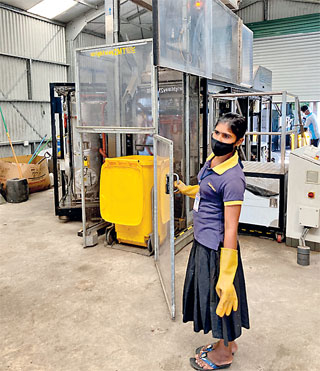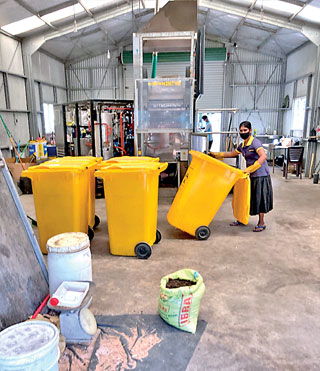Monday Feb 23, 2026
Monday Feb 23, 2026
Saturday, 19 February 2022 00:00 - - {{hitsCtrl.values.hits}}
 |
| Metamizer at AMHK |
 |
| Women sorting waste at hospital site
|
The disposal of clinical waste is a huge problem for healthcare facilities (HCF) in Sri Lanka. The lack of proper infrastructure, space and awareness are some of the reasons for the improper disposal of our hospital waste which cause hazardous emissions, pollution, disease and environmental issues. Many localised healthcare facilities have to find ways and means to dispose of their own wastes efficiently and responsibly with the least possible inconvenience to community and climate.
Localised management of healthcare facilities
In 2009, the first autoclave, a steriliser that kills harmful bacteria, was established at the National Hospital of Sri Lanka (NHSL) by a private company. The operations were carried out by the same company and NHSL paid for the service on a per kilo of waste-treated basis. The Castle Hospital established a shredder and autoclave during the same period, and NHSL sent their sharps (medical equipment with points or cutting edges capable of causing injury) to this location. Some private hospitals and the Jayewardenepura Hospital also established their own incinerators (used for the combustion of hazardous hospital waste). However, the disposal of end-products (residue) continued to be an issue, with municipal council workers and representatives mostly uninformed of the non-infectious nature of this waste.
For this purpose, an incinerator was established in the Mulleriyawa area but due to public protest and poor hygienic conditions such as smoke and odour, the Courts made a ruling to stop the activities of that company in 2012. The operation was re-established at Muthurajawela with the permission of the Ministry of Health (MoH) and the Central Environmental Authority (CEA). Simultaneously, the MoH and provincial administrations started establishing their own incinerators and Metamizers (hybrid autoclaves) in several hospitals in 2013. During the period from 2013 to 2016, MoH has taken steps to establish 20 Metamizers and five incinerators throughout the country with a soft loan from the Government of Australia.
However, major constraints of clinical waste management were identified as limited financial allocation, poor monitoring of the program by higher authorities, clinical waste management not being recognised as a priority by the institutions, inadequate capacities of waste treatment equipment, difficulties with their operation and maintenance and lack of a disposal methods for the toxic residue from incinerators and the residue from
Metamizers.
To find solutions, a pilot study was conducted recently by a team of healthcare experts at two HCFs, namely the Ashraff Memorial Hospital in Kalmunai (AMHK) and the District General Hospital in Monaragala (DGHM) to study their localised healthcare waste management. These two hospitals were selected because of their commendable waste management operational concept of “Waste Management Hierarchy”, which is the active and effective mobilisation of all staff as well as the consideration of all environmental issues related to HCWM. The areas studied were waste generation, stakeholder responsibility, and fostering strategic partnerships with local authorities, HCFs, local and private sector organisations, among others.
Both hospitals have their own incinerators, Metamizers, wastewater treatment plants, and established waste segregation outside each ward. There are nursing officers appointed to oversee the waste system management in each ward, especially the careful handling and disposal of infectious wastes and sharps. Janitorial staff are tasked with the transportation of the segregated wastes to designated disposal areas for autoclaving, incineration, open burning, recycling, biogas generation or disposal to the municipal system. They are provided with safety equipment such as boots, gloves and safety uniforms.
Both facilities also disallow visitors from bringing in polythene bags, plastic water bottles, lunch sheets, disposable Styrofoam lunch-boxes, uncut king coconuts and outside food into the hospital premises, thereby eliminating a considerable amount of plastic waste and littering. AMHK provides reusable bags at minimal cost as an alternative.
Gender sensitivity in healthcare facilities
Gender considerations in waste management projects, especially dealing with healthcare waste, is important as men and women can be impacted differently by chemicals/wastes and through other routes. Additionally, gender can play different roles in decision-making on pollution prevention, waste management, identification of sources of chemical exposure, and building a safer environment for communities. Along with the above study, the team also studied the hospitals’ innovative and gender responsive solutions in accordance with existing National and WHO standards (https://www.who.int/news-room/fact-sheets/detail/health-care-waste).
Sri Lanka’s healthcare sector has very strong female representation with over 50% of doctors and 95% of nurses being female, and they play a crucial role in the integration of this sector. In other areas of this sector, women work mainly in janitorial, accounting and HR. However, despite this being a crucial sector, there is no gender policy in the healthcare system in Sri Lanka.
In the two pilot-study hospitals, the administration and medical profession are found to be predominantly male at decision-making levels, while nursing staff are overwhelmingly female. In areas of minor staffing, the ratio favours males while janitorial services are mostly handled by female, reflecting the socio-economic background from which they are drawn and their employment conditions.
Gender categorisation at the two hospitals
Category Male Female
Hospital Administration 34 47
Medical 167 115
Nursing 56 482
Healthcare support staff 318 273
Janitorial 32 249
However, the waste management decision-making mechanisms appear to have strong female representation which includes the matrons, heads of units, the Infection Control Unit along with the janitorial supervisors. But even so, women and men are impacted differently by chemicals/wastes through different routes. During the pilot study, it was observed that they have different experiences of dealing with sources of exposure, different priorities, responsibilities and needs relating to the reduction of toxic chemicals and wastes.
A standard gender policy within the healthcare service will establish protocols that impact gender accordingly. A policy will indicate and influence working conditions and proper environments for night shifts and breaks, the need for clean and sanitised PPE whilst working in this COVID-19 situation, and adequate training on how to safeguard themselves when disposing of hospital waste.
While nurses undergo training once a year on handling hazardous wastes, they do not fully comprehend gender-related issues such as the lack of compliance from supervisory (medical, matron) or subordinate (healthcare assistants) staff, especially on waste generation issues.
The DGHM, like the AMHK has a fairly detailed waste management policy and a waste management plan, although it does not explicitly incorporate gender consideration nor is there a separate gender policy for the hospitals. The waste management policy only specifies that all possible waste will be handled within the hospital premises and that all waste handling staff should be adequately trained and equipped for the task.
Healthcare assistants support nurses in the clearing of wards and waste segregation (especially sharps and infectious wastes) duties. Janitorial staff are tasked with the transportation of the segregated wastes to designated disposal areas for autoclaving, incineration, open burning, recycling, biogas generation or, in some cases, for disposal at the municipal system. The janitorial staff are trained once a year and provided with safety equipment such as boots, gloves and uniforms.
At DGHM, an Infection Control Unit (ICU) led by the resident female microbiologist along with an all-female team is tasked with the supervision of hospital-wide infection control, waste management and sanitary conditions. The unit provides mitigation measures in case of accidents, and maintains regular checklists forward sanitation and control measures. This unit also provides data entry support to the COVID Vaccination roll out at the District General Hospital.
At AMHK, there is adequate female representation in management. However, doctors and paramedics outnumber females, probably reflecting the geographical and cultural context of the hospital. Healthcare assistants and janitorial staff are female, again a reflection of the socio-economic background of the location.
Nursing officers have been appointed to oversee waste management and a Public Health Inspector attached to the hospital supervises the segregation and functioning of waste throughout the wards and units and creates a daily report. Like Monaragala, the AMHK waste management system too is dominated by females.
Although there is no disparity in monthly and overtime pay, there is an urgency to improve working conditions and safety measures for women within the healthcare system to correct gender disparities. Many of the female employees at these healthcare facilities were found to be the sole breadwinners or supplement the family’s income.
Conclusion
While the burning or incineration of waste results in the generation of various pollutants and toxic compounds that can affect human health, the environmental consequences of poor HCWM practices also have a social dimension that could cause harm to anyone who comes into contact with the waste during its entire stages of the life cycle. It is imperative that proper, sustainable waste disposal habits and methods are utilised to facilitate social wellbeing and environmental consciousness. The surveys conducted at the AMHK and DGHM showcase as examples the establishment of innovative and gender responsive localised solutions in accordance with national and WHO guidelines.
However, it is unfortunate that there are no Standard Operating Procedures (SOPs) when it comes to gender-based work in healthcare waste management in the national healthcare system. The only gender-related guidelines found online were SOPs for gender-based violence. This area will be recommended to the Health Ministry by the experts.
The surveys were assigned by the United Nations Development Program in Sri Lanka on behalf of the Ministry of Health and conducted by experts in the fields of healthcare, environment and climate change, occupational health and waste management.